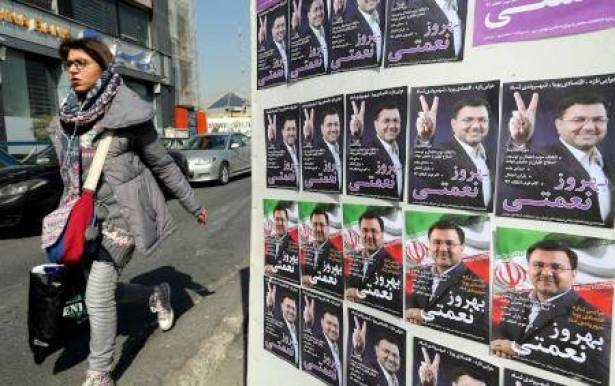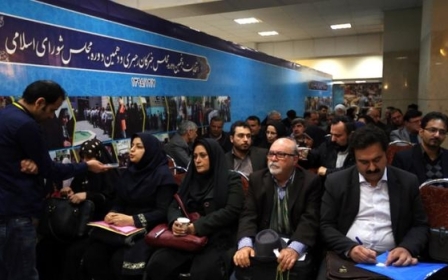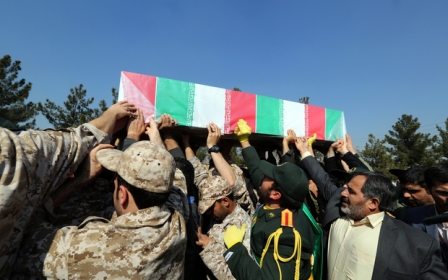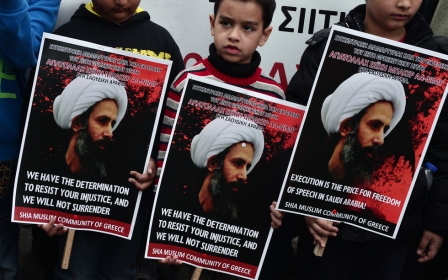Iran's app-building, reform-seeking youth voters

TEHRAN - In the appproach to Iran's parliamentary elections scheduled for this Friday, politicians have been courting an increasingly significant youth vote, including three million Iranians expected to vote for the first time.
Iran has around 55 million eligible voters. With a quarter of Iran's 80 million population under 25-years-old and those 18 years and older legally able to vote, young Iranians have the potential to strongly influence an election that they increasingly see as the only way to reform the country, said reformist political analyst Rasool Hosseini.
“Iranian youths’ views have changed. They regard the election as the only way to reform the country,” Hosseini told Middle East Eye.
Politicians and campaigners have been quick to pick up on youth interest, focusing on issues important to young people and also running candidates with whom they can relate.
“Parties have paid attention to youth and have introduced young candidates," Abolghasem Raoufian, a political analyst, told MEE. “This means they care about young Iranians and seek to represent them in the parliament."
Issues close to young Iranians, Roaufian said, including reducing the country's unemployment rate and helping young people start families.
Some analysts suggest that, with the causes that spark their interest, young people may be more likely to vote for moderates and also for reformists, a group which struggled to get many of its candidates into races, prevented from standing by the country's Guardian Council.
“In the reformist discourse, you can find responsibility, accountability, patriotism and development,” Hosseini said.
Milad Gholami, a 20-year-old hotel management student at Islamic Azad University in Tehran who will vote for the first time this week, said that is certainly true for him.
"I’m determined to vote for moderates and reformists," Gholami said.
“Hardliners had an unforgettable role in Iran’s setbacks and the sanctions imposed on our economy. I’m a fan of the moderation camp, they are against hardline views and care about our country’s economy and its image in the world."
Apps pushing boundaries
Social media is expected to play a large role in the election, including Telegram, a new Russian app that has about 20 million users in Iran and offers news channels, so far without government interference. Viber, which was previously quite popular, was banned in 2014.
Many of the news channels on Telegram are active with high numbers of users including Eslahtalaban News, a channel controlled by a group of young fans of reformists that has attracted more than 140,000 users.
Eslahtalaban carries reports that official news outlets often don’t publish, including comments from former reformist President Mohammad Khatami who urged voters to back moderates and reformists in a taped message earlier this week.
Iran’s judiciary, headed by Ayatollah Sadeq Amoli Larijani, has banned official news outlets from covering Khatami as the judiciary blames him for 2009 post-election unrest.
The Eslahtalaban channel’s administrator, Sami Uve, told MEE: “I’m seeking to help the reformist movement, which has been unjustly oppressed during recent years.
“There are far more conservative-affiliated news outlets than those backing reformists, plus, Iran’s state TV doesn’t have a fair view of reformists and often attacks them,” he said.
“We will keep trying to increase the number of our followers and we will work within the framework of our Islamic revolution."
The campus vote
University student associations, historically important in Iranian elections, have revved up their activities as the election approaches.
Generally, it appears that reformist associations of universities have been more active than their rivals.
For instance, a group of students at Persian Gulf University in the southwestern city of Bushehr designed a mobile app called "Candidate" to help people get to know moderate and reformist candidates better.
Associations have also invited their preferred candidates for speeches at their universities although some hardline supporters have tried to block reform candidates from speaking.
A few days ago, Ali Motahari, a moderate MP who has criticised the mass disqualification of candidates, was invited to Islamic Azad University in Parand, a city close to Tehran, but the meeting faced pressure from hardliners, and was subsequently cancelled.
Nonetheless, these student associations remain adamant and continue to ask reformist candidates to accept their invitations.
“The electoral speeches at our universities have borne fruit, as many can choose the right person for the parliament," said Mohammad Hafezi, a political science student at University of Tehran.
Hafezi said he wasn't interested in participating in the elections at first, but heard Mohammed Reza Aref, a vice-president under Khatami and now the leader of a coalition of reformist candidates, speak at school and changed his mind.
Anita Mohammadzade, a civil engineering student at AmirKabir University, told MEE: “I believe the candidates’ speeches at the universities make our minds clear about the election and who to vote for.”
New MEE newsletter: Jerusalem Dispatch
Sign up to get the latest insights and analysis on Israel-Palestine, alongside Turkey Unpacked and other MEE newsletters
Middle East Eye delivers independent and unrivalled coverage and analysis of the Middle East, North Africa and beyond. To learn more about republishing this content and the associated fees, please fill out this form. More about MEE can be found here.




